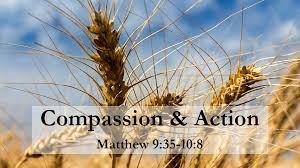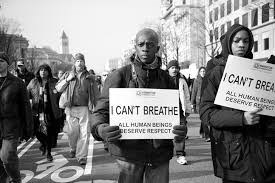Sunday 14th June 2020
14 Jun 2020 by O'Connor Uniting Church in: ReflectionsPentecost 2
Bible Readings
First reading: Genesis 18:1-15 (21:1-7)
Psalm: Psalm 116:1-2
Second reading: Romans 5:1-8
Gospel: Matthew 9:35-10:8, (9-23)

Some thoughts on today's scripture
The harvest is plentiful and ripe.
I think of the people around me and ask God
to enlighten me to notice where there is opportunity
to reap, gather or to acknowledge goodness.
I bring what is good before God,
giving praise and thanks.
There is so much good that is not noticed,
so many blessings that are unacknowledged.
I pray for a deeper appreciation of the rich harvest that is around me.
https://www.sacredspace.ie/content/matthew-935-101-6-8
Prayer of Thanks
Jesus thank you for coming among us and showing us how to live,
Thank you for dying for us that we might live,
Thank you for your resurrection, that we might believe,
Thank you for your Holy Spirit,
Thank you for the gift of faith, so that we might say with Thomas,
“Lord I believe, strengthen my faith.”
Refugee Week 14 to 20 June 2020


A Moment of Grace - A Prayer for Refugees
God of our Wandering Ancestors,
Long have we known
That your heart is with the refugee:
That you were born into time
In a family of refugees
Fleeing violence in their homeland,
Who then gathered up their hungry child
And fled into alien country.
Their cry, your cry, resounds through the ages:
“Will you let me in?”
Give us hearts that break open
When our brothers and sisters turn to us
with that same cry.
Then surely all these things will follow:
Ears will no longer turn deaf to their voices.
Eyes will see a moment for grace instead of a threat.
Tongues will not be silenced but will instead advocate.
And hands will reach out—
working for peace in their homeland, working for justice in the lands where they seek safe haven.
Lord, protect all refugees in their travels.
May they find a friend in me
And so make me worthy
Of the refuge I have found in you.
Amen.
(Common Grace: A Prayer by the Catholic Relief Services for Refugees)
Pastoral Letter from Rev Dr John Squires Presbytery Minister - Wellbeing
Racism and Reconciliation
“I can’t breathe.” Three short words. Three words that shot around the world. “I can’t breathe.”

We all know who said that, and the circumstances that drew these words from his mouth. We all know that soon after he said this, George Floyd died. Another black man, dead, at the hands of a white police officer.
“Ah well, that was in America”, you might think. Yes, it was. And many other Afro-American people have died in similar circumstances, victims of what appears to be, quite simply racism. A shameful story. A shameful record. But in America. Not here. Not in Australia.
Except—not so fast! Because here, in Australia, we have recently been reminded, there are 434 people—black men and women, indigenous Australians—who have died whilst in police custody, since 1991. (That was the year when the Royal Commission into Aboriginal Deaths in Custody ended.)
And one of the more recent people to die in such circumstances in Australia also uttered those words: “I can’t breathe.” (David Dungay, in 2015. And he said this phrase twelve times, before he died.)
So we are not exempt from the shame of this racist record. Our very own nation has not yet found a way to address the systemic bias, the systematic persecution, of indigenous Australians. They are only 3% of our population, but they are represented amongst the prison population in numbers out of proportion to their presence in society. And from all of those 434 deaths, after multiple enquiries, there have been—how many convictions? The sum total remains at zero.
What does this have to do with our faith? How does this impact on us as we go about our lives as followers of Jesus?
Last week, Dr Deidre Palmer, the President of our National Assembly, wrote:
“In the Bible, our sacred text, we hear God’s cry for justice for those who are living in poverty, those who are oppressed by unjust systems, those who are excluded and discriminated against.”
She went on to say:
“The Jesus we know from the Gospel stories, calls leaders to use their power in service to others, to call forth in others compassion, justice and kindness, unity and community. These are the leaders, we are called to be and that we need in the world today.”
Pastor Mark Kickett, the Interim National Chairperson of the Uniting Aboriginal and Islander Christian Congress, joined his voice on this issue, saying: “It boggles the mind as to how such inhumanity continues to exist in the modern world in which we live, yet it still does.” He quotes the Prophet Amos: “Amos speaks very clearly in relation to this matter where he says; ‘But let justice roll down like waters, and righteousness like an ever flowing stream’” (Amos 5:24).
Our faith includes a clear call, for us to work so that we avoid perpetuating such injustices in our society. Our President said, in her Pastoral Letter for National Reconciliation week:
“we need to strengthen our actions for justice, healing and reconciliation. This is not an abstract call – it is seen expressed daily in our relationships with one another in this country.
It is seen when we:
- call out racism;
- tell the truth about the history of colonisation, dispossession and the undermining of First People’s culture, language and spirituality;
- advocate for First People’s voice to be heard in determining their future;
- respect and appreciate the culture and stories of First Peoples, and work together to deepen our relationships based on reconciliation that arises from justice, and leads to healing; and.
- live in harmony with the sacred land that we share.”
That is the challenge that sounds forth from our church leaders. That is the challenge that sits at the heart of the Gospel. As we live our lives by faith, following the way of Jesus, might we know also the claim that these words have on us.
We are called to stand firm for justice, to stand firm against injustice.
If that means that no black person in custody will then have to utter those tragic words, “I can’t breathe”—it will be worth taking that stand.
Pastoral Letter from Rev Andrew Smith, Presbytery Minister: Congregation Futures
“What if” – What it might look like to live out the Five Habits of Highly Missional People
Last week we began to imagine a series of “What ifs” to helps us picture how adopting Mike Frost’s five habits could transform a congregation. These habits are from Frost’s handy little book “Surprise the World – The Five Habits of Highly Missional People”. This week let’s imagine again. Maybe all this imagining will help you see ways that Frost’s habits could take shape for your church in your local community.
What if a couple of people in the congregation are really keen about basketball? Between them they not only love playing basketball, but also enjoy helping others develop their skills in basketball. They meet up regularly at the local university courts for skills training and playing one on one games. As it turns out, there are others who come to the courts individually or in small groups to do pretty much the same thing. Often, they join in playing games with each other.
What if the couple of people from the congregation are encouraged to read Mike Frost’s book, and they begin to see that they are already practising parts of the book in their basketball group, and they begin to imagine how else they might put those habits into practice.
What if they decide to be intentional about blessing the people they meet on the basketball court? In the first place they will bless these others through the fun they have together playing games. They will affirm them in their skills and good plays in games, and will offer them suggestions for how they might improve their technique. They realise that this is what they would do naturally quite apart from Frost’s habit, but with Frost’s habits in mind they now see that their passion and skills in basketball are part of their Christian ministry. They are aiming to live questionable lives in how they interact with those who they join with in playing basketball.
What if over some weeks of playing, there is one particular person who is joining in with them regularly. Through their common interest in basketball friendships are developing and they are learning more about each other’s lives. In one of their conversations it comes up that the two know each other from church. It seems really easy at that point to offer an invitation to come to church with them. But they hold off from doing that. Instead they are imagining that in some way a new form of church might grow out of these relationships.
They are imagining that over time some from the group of basketball players might be keen to meet up for a BBQ together, which might turn into more regular times of eating with each other. The two from the congregation want to keep blessing and eating in this way and will be watching and listening for how the Spirit is moving among them. They feel called to invest in sharing deeply in the lives of their new basketball friends. On this journey of sharing life together they are trusting in God to be working and are ready to encourage signs of faith – perhaps there will be a small group from among the bigger group who will want to explore questions of life and faith together.
What if COVID-19 comes along and puts a hold on the group getting together to play basketball. But the two from the congregation keep meeting up, and at times shoot around together at a basketball court (keeping appropriate social distancing!!). It is during this time that one of them speaks about his work in retail. Before COVID-19 he was struggling with the attitudes of customers. In COVID-19 it has been even worse, and it is taking a bigger toll on him. They remind each other of the accounts of Jesus relating with people, and the compassion he showed. Together they wonder about what it means to live in Christ and for Christ to live in them, and how the compassion of Jesus is in them to be compassionate, even toward the difficult customers. They are learning Christ together. They are discipling each other, nurturing each other and keeping one another accountable. Maybe this is a pattern for the small group of basketballers who might, down the track, want to explore questions of life and faith together. Maybe this is the beginning of fresh and vibrant expression of church.